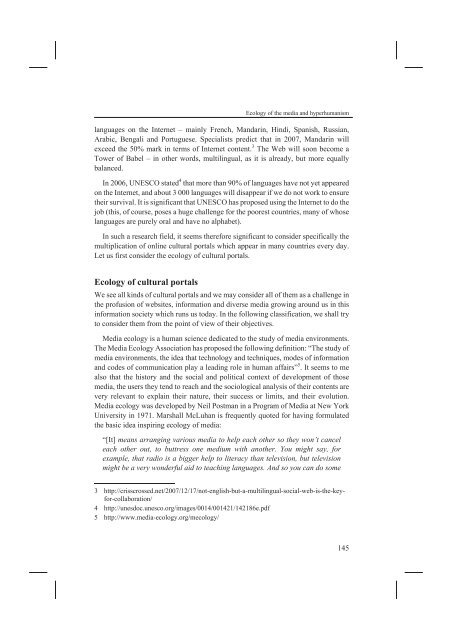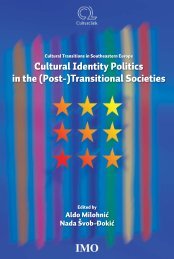D:\Documents and Settings\Ana\My Documents\Biserka-knjiga ...
D:\Documents and Settings\Ana\My Documents\Biserka-knjiga ...
D:\Documents and Settings\Ana\My Documents\Biserka-knjiga ...
You also want an ePaper? Increase the reach of your titles
YUMPU automatically turns print PDFs into web optimized ePapers that Google loves.
languages on the Internet – mainly French, M<strong>and</strong>arin, Hindi, Spanish, Russian,<br />
Arabic, Bengali <strong>and</strong> Portuguese. Specialists predict that in 2007, M<strong>and</strong>arin will<br />
exceed the 50% mark in terms of Internet content. 3 The Web will soon become a<br />
Tower of Babel – in other words, multilingual, as it is already, but more equally<br />
balanced.<br />
In 2006, UNESCO stated 4 that more than 90% of languages have not yet appeared<br />
on the Internet, <strong>and</strong> about 3 000 languages will disappear if we do not work to ensure<br />
their survival. It is significant that UNESCO has proposed using the Internet to do the<br />
job (this, of course, poses a huge challenge for the poorest countries, many of whose<br />
languages are purely oral <strong>and</strong> have no alphabet).<br />
In such a research field, it seems therefore significant to consider specifically the<br />
multiplication of online cultural portals which appear in many countries every day.<br />
Let us first consider the ecology of cultural portals.<br />
Ecology of cultural portals<br />
Ecology of the media <strong>and</strong> hyperhumanism<br />
We see all kinds of cultural portals <strong>and</strong> we may consider all of them as a challenge in<br />
the profusion of websites, information <strong>and</strong> diverse media growing around us in this<br />
information society which runs us today. In the following classification, we shall try<br />
to consider them from the point of view of their objectives.<br />
Media ecology is a human science dedicated to the study of media environments.<br />
The Media Ecology Association has proposed the following definition: “The study of<br />
media environments, the idea that technology <strong>and</strong> techniques, modes of information<br />
<strong>and</strong> codes of communication play a leading role in human affairs” 5 . It seems to me<br />
also that the history <strong>and</strong> the social <strong>and</strong> political context of development of those<br />
media, the users they tend to reach <strong>and</strong> the sociological analysis of their contents are<br />
very relevant to explain their nature, their success or limits, <strong>and</strong> their evolution.<br />
Media ecology was developed by Neil Postman in a Program of Media at New York<br />
University in 1971. Marshall McLuhan is frequently quoted for having formulated<br />
the basic idea inspiring ecology of media:<br />
“[It] means arranging various media to help each other so they won’t cancel<br />
each other out, to buttress one medium with another. You might say, for<br />
example, that radio is a bigger help to literacy than television, but television<br />
might be a very wonderful aid to teaching languages. And so you can do some<br />
3 http://crisscrossed.net/2007/12/17/not-english-but-a-multilingual-social-web-is-the-keyfor-collaboration/<br />
4 http://unesdoc.unesco.org/images/0014/001421/142186e.pdf<br />
5 http://www.media-ecology.org/mecology/<br />
145



